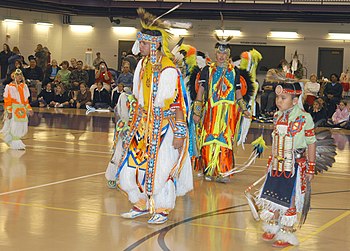Ho-Chunk people
|
Members of the Winnebago Tribe of Nebraska's dance team at the Lied Activity Center in Bellevue, Nebraska, 2006
|
|
| Total population | |
|---|---|
| (7000 (1990)) | |
| Regions with significant populations | |
| United States (Wisconsin, Nebraska and Iowa) | |
| Languages | |
| English, Hocąk | |
| Religion | |
| Medicine Lodge, Native American Church, Christianity | |
| Related ethnic groups | |
| Iowa, Otoe, and Missouria |
The Ho-Chunk, also known as Hoocąągra or Winnebago, are a Siouan-speaking Native American people whose historic territory includes parts of Wisconsin, Minnesota, Iowa, and Illinois. Today, Ho-Chunk people are enrolled in two federally recognized tribes, the Ho-Chunk Nation of Wisconsin and the Winnebago Tribe of Nebraska.
The Winnebago Tribe of Nebraska have an Indian reservation in Nebraska. While related, the two tribes are distinct federally recognized sovereign nations and peoples, each having its own constitutionally formed government, and completely separate governing and business interests.
Since the late 20th century, both tribal councils have authorized the development of casinos to generate revenue to support economic development, infrastructure, health care and education. The Ho-Chunk Nation is working on language restoration and has developed a Hoocąąk-language app for the iPhone. Since 1988, it has pursued a claim to the Badger Army Ammunition Plant as traditional territory; the area has since been declared surplus, but the Ho-Chunk have struggled with changes in policy at the Department of the Interior. The department supported the Ho-Chunk claim in 1998, but in 2011 refused to accept the property on their behalf.
In 1994, to build on its revenues from casinos, the Winnebago Tribe of Nebraska created an economic development corporation; this has since grown and has received awards as a model of entrepreneurial small business. With a number of subsidiaries, it employs more than 1400 people. It has also contributed to housing construction on the reservation. Like more than 60% of federally recognized tribes, the Winnebago Tribe has legalized alcohol sales on the reservation to secure revenues that previously went to the state in retail taxes.
...
Wikipedia

